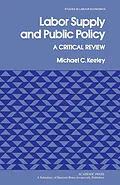Labor Supply and Public Policy: A Critical Review deals with the theoretical and empirical econometric research done on the determinants of labor supply and with the effects of public policies on labor supply. This book reviews the various estimates made from studies concerning the economics of labor supply and evaluates the econometric methods that these studies have used. This text also analyzes the labor-supply phenomena, the costs of the different public programs, as well as, the implications of the empirical findings of these studies. The emphasis is on empirical research: many policies that are made depend on the scale of changes in the wage rates and non-market (household) income on hours of work. This book also focuses more on the determinants of the allocation of time between the market and household sectors. The text notes that by using the means of the estimates in the different studies under review, the labor-supply response to public policies involving net wages or income, shows a substantial (but not overwhelming) reaction. This book then correlates this finding with the tax and transfer programs, such as food stamps, unemployment insurance, AFDC (aid to families with dependent children), and NIT (negative income tax). This book is suitable for economists, social workers, and policy makers who are involved in social services, community development, welfare, taxation, labor, and employment.
Inhalt
Preface
Acknowledgments
1 Introduction
2 Review of the Economic Theory of Labor Supply and Empirical Representations of Labor-Supply Functions
Introduction
A One-Period Family Model of the Demand for Leisure
Empirical Representations of the Labor-Supply Function
Conditional Labor Supply and Labor-Force Participation
New Developments in the Theory of Labor-Supply
Conclusions
3 The Effects of Public Policies on Labor Supply
Introduction
Income Maintenance
Wage Subsidies
Income Tax
The Effects of Other Public Policies on Labor Supply
The Welfare Cost of a Tax or Subsidy
The Value of Leisure and Measuring the Effects of Public Policy on the Distribution of Income
Transfer Programs and the Distribution of Income
The Determinants of Participation in Tax and Transfer Programs
4 Review of the Nonexperimental Research on Labor Supply
Introduction
Econometric Issues
A Review of Empirical Findings
Summary and Policy Implications
5 Review of the Experimental Labor-Supply Research
Introduction
Design of the Experiments
Problems with the Design Model
Statistical Models Used to Estimate Response
Estimates of Labor-Supply Response
What Has Been Learned from the Experiments
References
Subject Index
